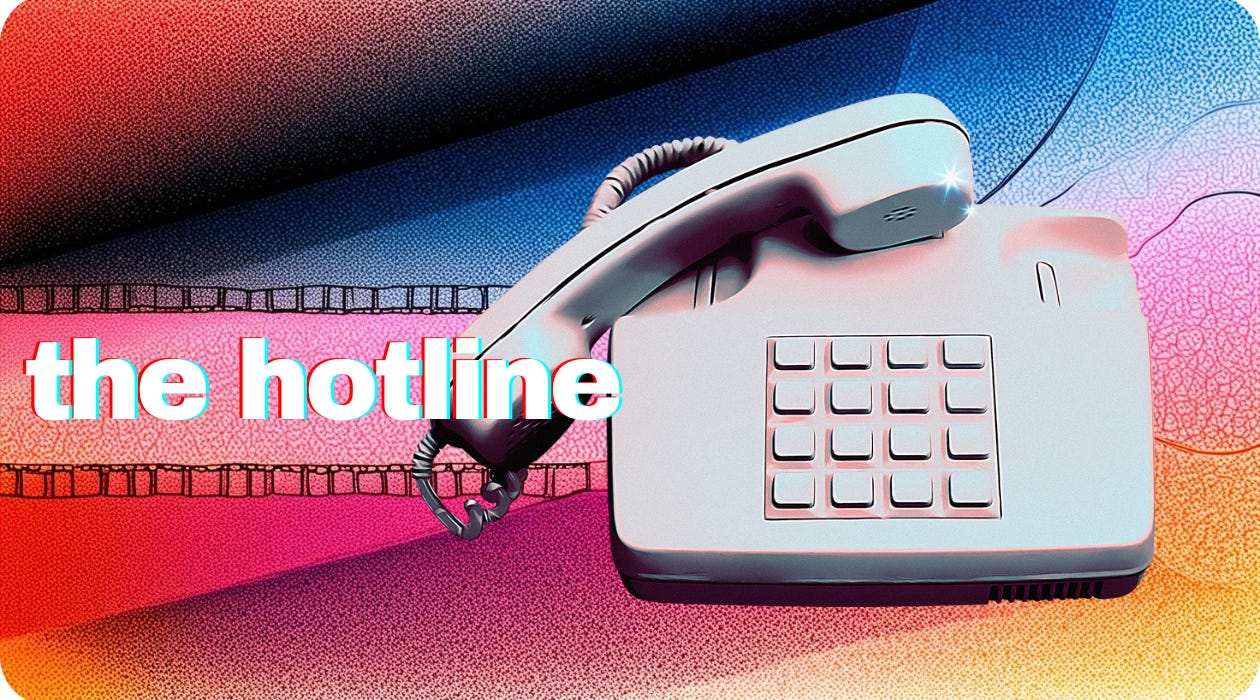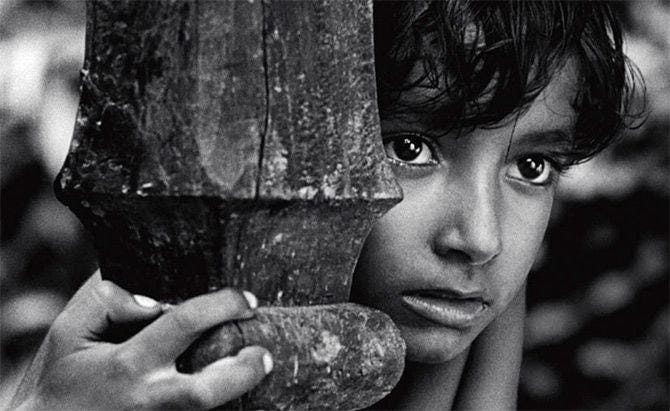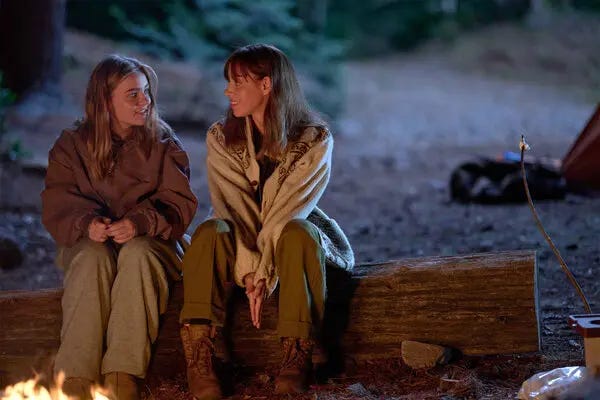why does ugly crying in public spaces seem to be the only honest response to good cinema?
Two reader confessions from the front lines of being human while accidentally stumbling into art.
Welcome to our first TFS Reader Hotline, where I finally shut up and let you do the talking.
I spend a lot of time pontificating about cinema from my couch, but your submissions remind me why I fell in love with movies in the first place: they ambush us when we least expect it.
Two lovely readers wrote about films that cracked them open at exactly the right moment. Both stories involve ugly crying in dark spaces, both involve unexpected catharsis, and both made me realize I've been approaching grief all wrong. If you've ever had a movie physically change your breathing patterns or make you set daily phone reminders about mortality, you'll recognize yourself in the following paragraphs.
TRIGGERED
From Nick VanAmstel:
This one really hurt. My brother, who also happened to be my best friend, passed away suddenly in May of 2023. I was (and still am) crushed. The previous year I had started watching the BFI Top 100 movies. Every Saturday night I would sit in my darkened theatre (my garage) and watch one movie from the list in order. Sometimes I would write something about the movie, sometimes not. After my brothers death I continued to watch these classics of world cinema but I have to tell you, my heart wasn’t in it. The wound was still too fresh. But then I watched a work of art that truly devastated me, in the best way. I still have the notes so I can pinpoint the date when maybe my heart started to heal. August 12-2023.
That night I watched Pather Panchali. I had never heard of it or the director, Satyajit Ray. I love going into a movie knowing absolutely nothing about it. I don’t want to spoil the movie for you but there is a scene that is maybe one of the most painful in all of art. I ugly cried so hard and so long. It felt like my heart was being shredded. Your ancestors knew-catharsis. A cleansing. When I woke up the next morning, it felt like the first time in months I could take a deep breath. I’m not saying my grief was magically healed. What I am saying is it felt like a door had opened up a crack and there was some light that was trying to get in and was just slightly visible around the edges. Anyways that’s all I got.
From Sophie:
Nick, I'm sorry about your brother.
I've been thinking about your email for days. Initially, I wanted to reply with some analysis of Satyajit Ray's techniques or context about Pather Panchali's place in film history. But that academic bullshit would miss the actual significance of what happened to you on August 12th.
For those who haven't seen Pather Panchali (and you should), it's the first film in Ray's Apu Trilogy, shot in rural Bengal in the 1950s with non-professional actors and a microscopic budget. Ray had never directed before. The result somehow captures the raw essence of being human in ways that billion-dollar franchises can't touch with a ten-foot pole.
Films physically change us. I don't mean this metaphorically. Movies literally alter our heart rates, breathing patterns, muscle tension, hormone levels. The right film at the right moment rewires our nervous systems – something I've experienced firsthand.
I spent a lot of summers with my late granddad in his hometown, Karystos. He taught me everything from philosophy to gardening 101 to swearing in three languages. Our ritual was Sunday afternoon strolls at an old theater nearby. He smuggled in homemade spanakopita wrapped in newspaper; I'd pretend not to notice the ushers pretending not to notice.
Unlike your sudden loss, my grief came in slow motion. Dementia took my grandfather over four years. Each Skype call from London, I watched him fade by degrees. First forgetting small things, then forgetting me entirely. When I moved abroad, I already carried the unfathomable ache of losing someone still physically present. By my second semester at uni, he recognized me only as "the girl from the TV." By the third, he stopped speaking altogether.
The call finally came during finals week. I'd been expecting it, even rehearsing my reaction. This anticipatory grief should have softened the blow. It didn't. Broke and on a shitty startup job, I couldn't afford a last-minute flight home. Instead, I wandered London zombie-like while my family prepared his funeral back home. On day three of this limbo, I ducked into the Prince Charles Cinema to escape rain. They were showing Ozu's Tokyo Story. I didn’t know much about it.
The film moves quietly, deliberately. Then comes the scene where Shukichi sits alone after his wife's death. Nothing dramatic happens – just an old man kneeling alone in an empty room, fanning himself. Something inside me cracked open. I doubled over in my seat, gasping for air. My body convulsed with sobs. A woman two seats away moved farther away. The manager found me later in the bathroom, knees pulled to my chest, still crying.
He helped me to the lobby, made tea. "Lost someone recently?" he asked. I nodded. "Thought so," he said. "Happens here more than you'd think."
Before this moment, I hadn't shed a single tear about my granddad. I'd been functioning – calling relatives, arranging to fly home somehow, attending classes. My body had shut down all feeling. Ozu physically broke that shutdown with images so simple they bypassed my intellectual defenses.
Few weeks later, I scraped together enough money for a flight home for the memorial. On the plane, exhausted and fragile, I made another mistake: Pixar's Coco. During the final song sequence with the elderly woman remembering her father, I broke down again. I wish the businessman next to me silently passed me tissues and ordered me a whiskey without speaking.
I tell you this story because I recognize myself in your garage that night. That moment when grief finally catches up to you physically – the ugly crying, the gasping for air, the complete surrender. People talk about grief like it's just sadness, but it's more like drowning while everyone around you breathes normally. For months after my granddad died, I felt like I was moving underwater. Sounds muffled, movements slowed, everything happening at a distance.
This underwater feeling is exactly why Ray's film cut through for you when all those BFI classics couldn't. In Pather Panchali, Ray doesn't show you grief but he dunks you in it, holds you under until you have no choice but to feel it. Most Western cinema directors pull the camera away at crucial moments or soften painful scenes with music. Ray refuses these escape hatches. He trusts you to sit with unbearable moments, much like grief itself forces us to do. I won't spoil the specific scene you mentioned, but I completely understand why it finally broke the dam.
Thank you for sharing something so personal. If more people wrote about movies like this, as emotional life events rather than objects to be rated, film discourse would be a hell of a lot more interesting.
REALITY CHECK
From Lauren Greenwood:
Dear Sophie,
My tale is one of sitting down to watch what I thought would be a brainless druggy buddy comedy and ended up making me add "It's your last day on earth" as a daily reminder into my phone. When I turned on MY OLD ASS (2024) and realized that it was set in Muskoka, Ontario (north of my hometown of Toronto) I got a little stoked for some deeply Canadian references. When the protagonist and friends set up camp to go on a wilderness mushroom trip, I thought I knew exactly what kind of film I was getting and Audrey Plaza's brand of comedy seemed to fit right in. It wasn't until halfway through the movie that I realized I had been swindled in the best way possible.
This film was actually as much about letting go as a parent as it was about coming of age. When I got to the end and realized that this was ACTUALLY a film about grief, it took me OUT. The speech the protagonist gives about not realizing when the last time that you'll ever do something as a kid is destroyed me. I got out my phone immediately, set a daily reminder to live in the moment every. damned. day. and proceeded to bawl happy / sad tears for the next thirty minutes. Not just because it moved me so much, but because I was so proud of this film I had absolutely nothing to do with. That daily reminder still pops up every morning!
From Sophie:
Oh friend - you thought you were signing up for Plaza-on-mushrooms hijinks in the Canadian woods and instead got psychological surgery without anesthesia. Welcome to the bait-and-switch film genre!
Here's the dirty secret about grief narratives: the ones that announce themselves with somber piano and rain-streaked windows are as emotionally effective as a DMV instructional video. The moment we see those rain-streaked windows and hear that first melancholy piano note, our psychic defense system springs into action like an overzealous bouncer at an exclusive club: Sorry, genuine emotion, you're not on the list tonight. We mentally prep our criticism toolkit. Noting the blue color grading, cataloging the weather-as-metaphor, measuring the exact diameter of the actor's dilated pupils during their tearful monologue.
The true subversion of My Old Ass is in its fundamental recognition that grief and joy share adjacent neural pathways. The film understands that laughter creates microscopic ruptures in our defensive architecture…tiny fissures through which authentic pathos can seep. Plaza's deadpan serves as both comedic device and Trojan horse, lulling you into receptivity before the existential payload detonates.
This misdirection works because our brains have evolved into pattern-recognition machines primed for categorical stability. When a cultural text suddenly violates its implicit contract with the viewer, morphing from stoner romp to meditations on mortality, it creates a rare form of cognitive dissonance that bypasses our usual meaning-making mechanisms. In other words, you were caught in a moment of genuine epistemological crisis. Your categories failed you, and in that failure, authentic engagement emerged.
What these bait-and-switch films get (and this is where they reveal their diabolical genius) is that modern humans have constructed psychological bunkers specifically designed to repel meaningful reflection. Sorry to Bother You offered workplace comedy before swerving into surrealist anti-capitalism. The Lobster pretended to be quirky romance until revealing itself as dystopian commentary on relationship anxiety. Even Parasite showed up wearing a black comedy disguise before transforming into a blood-soaked class warfare manifesto.
In all honesty, I’m jealous of that feeling you experienced. I can't remember the last time a film pulled that kind of switcheroo on me. Maybe I'm too media-literate for my own good, or maybe I've seen so many indie dramedies that I can spot the third-act reveal coming from the opening credits. Either way, your letter makes me want to deliberately seek out films under false pretenses. I think I'll just google "best dumb action movies" and hope one of them secretly contains a philosophical thesis on the nature of consciousness.
Next time your phone buzzes with that mortality reminder, think of it as a tiny commemoration of having been beautifully deceived. In the cacophony of notifications telling you what to buy, who to be, and how you're falling short, allowing yourself to be ambushed by unexpected meaning might be the most authentic transaction you've had in years.
And that's all for our first TFS Reader Hotline! Send your confessions to sophie@thatfinalscene.com or record your voice message for a chance to be featured in next month's edition.
And remember: People who send a submission get a free 3-month membership to TFS.
As a reminder, here are the categories of the Hotline:
Plot armor: The show or film that got you through a difficult time. Were you watching The IT Crowd for 12 hours straight after your breakup? Did you start spending money you didn't have on clothes after watching Sex and the City because shopping felt easier than dealing with your anxiety?
Spicy take: Your most controversial film opinion that you'll defend with your life. Think Twilight is better than The Godfather? Can't stand Meryl Streep? Give me your worst.
Reality check: The film or show that completely rewired your brain. Did a random documentary make you realize you've been wrong about something your whole life? Has a film ever made you call someone you hadn't spoken to in years?
Triggered: When something on screen or in the theater hit you unexpectedly hard. Did someone's phone going off in a recent viewing send you into a rage spiral? I need to hear it.







